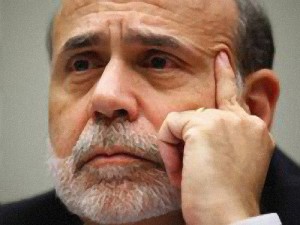Previewing Jackson Hole: Why Markets Are Setting Themselves Up for Disappointment
 Photo: snowlepard
Photo: snowlepardOn Friday all econ-loving eyes will be focused on Jackson Hole, Wyoming. Think of it as Oscar night for macroeconomists. Except with sensible shoes rather than plunging necklines. But the anticipation and gossip is just as intense. Markets are convinced that Ben Bernanke’s going to make a major announcement. I disagree. Here’s why:
1. Central bankers generally try to be more boring than their audience wants them to be. That won’t change.
2. The run of data since the last Fed meeting hasn’t really changed, so why would monetary policy?
3. Given the slim governing coalition, Ben can’t get too far ahead of the rest of the committee. So look for all the action to come from official Fed statements, rather than cryptic hints at Jackson Hole.
4. Sometimes Fed Chairmen are accidentally more interesting than they mean to be. At last year’s conference Big Ben shared some of his thinking about alternative monetary tools. This was news in 2010, and it excited the markets. But today, we’ve all thought long and hard about the alternatives, so it’s hard to see a surprise coming.
So what is he going to say? His goal will be to fill in the blanks from the Fed’s most recent statement:
1. The Fed has (finally!) figured out that the economy is weak, and likely to remain so. He’ll explain why.
2. The Fed also “discussed the range of policy tools available to promote a stronger economic recovery in a context of price stability.” He’ll tell us what these are, and there won’t be any surprises. The point is to reassure us that the Fed can do still more to help a stalled economy.
3. He will probably say something about how bad things have to get before he’ll use these unconventional tools. This is the part that will get the markets all hot and bothered.
4. I also expect him to say more about the Fed’s latest promise to keep interest rates until mid-2013. Except cautious central bankers don’t actually promise anything. Instead, the Fed said that it “anticipates that economic conditions… are likely to warrant exceptionally low levels for the federal funds rate at least through mid-2013.” No one is going to be happy when Ben describes the conditions under which he’ll break this perceived promise.
I’m going to be watching for something altogether different. Last year, Ben said that the risk of deflation justified aggressive unconventional monetary policy (aka “QE2”). That risk has largely disappeared. If he hints that expansionary monetary policy is still a good idea when inflation is positive (albeit low), then we’ve learned that policy really is changing. With inflation so tame, and unemployment out of control, it’s also the right policy..
And what about the more radical ideas—Blanchard or Rogoff’s higher inflation target, Sumner’s nominal GDP target,or Mankiw’s price-level target? All good ideas. But I just don’t see ‘em happening. If the markets are looking for this, they’re going to be disappointed.
Bottom line: There’s a fair chance that Ben signals a more expansionary monetary policy. But I don’t think it will be in the form the markets are hoping for (“QE3”). This is why I’m betting they’ll be disappointed.

Comments